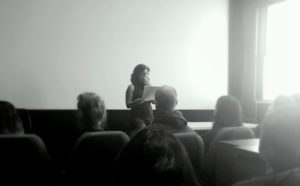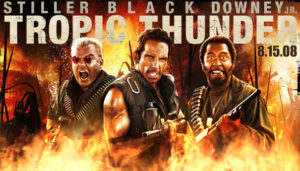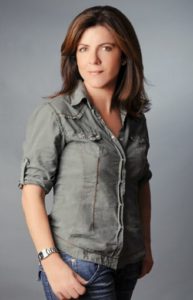Industry powerhouse Rebecca Kitt’s acting technique has become a valuable resource for directors like Ben Stiller and innumerable actors, including Mary Elizabeth Winstead.
The acclaimed Acting Coach recently taught a fervent acting workshop at the American Film Institute – where actors and many more directors confronted the ultimate path to great storytelling: Know Thy Self and Know Thy Work!

Rebecca Kitt teaching at the AFIC WDA Acting Workshop 2018. Photo By B. Stepansky
Stanislavski, Adler, Strasberg, Meisner, Hagen. All teachers, all with their own techniques from a core belief they have about acting. What’s Rebecca Kitt’s technique? What do you believe is the core of great acting? What do you think is core in great directing of actors?
I love all the techniques you list above. I tend to use Uta Hagen often when teaching class. I love her book The Respect for Acting. I think it’s important for the actor to know themselves, understand the human condition and to be honest with how they interact in their own lives.
Then there is the skill of knowing how to do the work. How physical actions work as strongly as the words for example. It’s important to understand how to move a scene along. Having a strong objective and understanding the obstacles to getting what you want.
Most importantly, it is essential to break down a script. To understand what the material is saying. To know the character’s influence and involvement in that story.
The core to great directing of actors quite possibly could be for directors to take an acting class. They need to understand how actors work. It’s important for the director to have a clear point of view. The director sets the tone of the film. That tone needs to be conveyed to the actor. Also the actor does not see themselves on camera. They are working from the inside. The director can help them see what the picture looks like in the director’s mind for each scene the actor is in.
What’s important for a director to know when hiring and collaborating with an acting coach?
I think the important part of this relationship is to work together. To understand that we are in fact collaborating but the coach is working with one actor usually. We are there to help the actor understand their character and how that character moves the story forward. We are another tool for the actor. It’s important for the director and actor to trust the coach.

Rebecca Kitt was hired by Ben Stiller and Dreamworks for the hit comedy “Tropic Thunder”
What’s the etiquette for the Director/Coach’s collaboration? If the Director is struggling getting what they want from the actor, is the coach also there for the director?
The coach is most definitely there for the director as well. When I work on set I make sure we are all a team. I’ve had times where the separation was pushed prior to my involvement. A sort of you against us approach. I clean that up immediately, because it doesn’t serve the process. We all want to make a good movie.
How close is your collaboration, are you in all rehearsals prior to shooting? When you work with actors alone – do you receive input from the director at all?
It really depends. Most often, I am quietly working with my private clients and they tell me what the director is communicating. Quite often directors don’t communicate much to the actors. Although just last week I was on the phone with a well know British director and my client who wants a part in his film. He gave us notes together so that she could do a tape and send it to him. These are some of my most gratifying experiences. His notes were incredibly smart and I enjoy that process.
How important is it for a director to know the actor’s process?
Very important – but actors tend to all work a bit differently, so I think a director can find a way that they work best and implement that on set. If you sit back and observe the actor it’s easy to see what they need. Most want to feel valued, loved, supported, cared for.
Many times directors will hire non-actors for various roles – Have you been on projects coaching non-actors? Any advice/methods for directors working with non-actors?
I recently worked with a professional wrestler. I was hired by the studio to prep him for a network test. I find that non-actors are nervous and it’s important to help them understand that the director is on their side.
I have tremendous respect for acting, so I believe the non-actor needs to understand the process. I try to give them the language used by actors and ask them to use that language. For example, objective, obstacle, beats and actions. This is what actively moves a scene along. It is important to understand that and then to use their own lives and infuse that in the moments. It’s a different world out there now and people are hired for Instagram followers and branding etc. However, I believe acting takes work and it’s important to put the work in. Actors are often born with a gift and then learn the skill. Both are important.
Actors are known to develop and use techniques in their careers – do you as a coach have a different technique entirely for coaching the actor or is it just the same as actor’s technique? In the AFIC WDA workshop you had a specific way of giving notes – it was almost like painting a color for them to see, making a sound, describing a texture and the actor responded to it easily. Could you elaborate?
This question is interesting to me. First, thank you for your observation. I think that is part of my gift. Not necessarily something I’m consciously doing. I do not ask the actor what technique they are using but I can usually tell as I’ve studied many methods. I like methods that get the scene and the actor active. I like to see characters needing something.
The collaboration between acting coaches and directors isn’t a common industry team we hear about a lot, like a director/cinematographer for example. Although there are many extraordinary films with acting coaches (Embrace the Serpent), is this collaboration truly uncommon or is it taboo to disclose? With a view to breaking the taboo, what is an acting coach bringing to a director’s film and their vision?
Unfortunately it’s taboo to disclose. I have actually cut deals with Studios to make more money and not receive a credit. We need to change this. It is rare that actors mention their acting coaches. I truly believe that we need to take the subtle shame out of this process. We are not crutches. We are needed just like coaches are needed in sports.
That’s a beautiful analogy. Athletes and coaches go hand in hand – and yet we still celebrate athletes for their individual achievement, as well as the coach. That collaboration is vital to the game. How do you think the actor/coach team will become more accepted in the eyes of the industry?
I’m not sure about this. I know that I’ve recently become more open about who I coach and proud of that process. It seems to me that the agents are afraid to admit actors work with coaches or need to work with coaches. The producers can be afraid as well – But casting directors, actors and directors want the collaboration so we all just need to dive in.
Actors have been known to seek out an acting coach for particular projects to improve and deepen their work and process. Can you add your perspective to a situation where the director initiates hiring an acting coach for the actors – the do’s and dont’s?
I think it’s important to be bold with this step. It’s a positive process. I always bring this back to the collaboration. Everyone’s involvement is key. The director simply needs to express the desire for a coach. Good coaches are respected.

Acting Coach Rebecca Kitt’s most recent project “Thank You for Your Service”
Have you ever had a disagreeable collaboration with an actor? For our directors, how can that strain be relieved if the director has no acting coach?
I have had actors join my class that have not liked the way I work. Quite honesty those actors have not been very talented or didn’t really want to do the work and they simply left class eventually. As far as on a project – I think it’s important for the director to be generous, open, and set an atmosphere on set of respect. If you find yourself in a situation where you and the actor don’t get along then I guess it’s best to power through and hope it all goes well in the editing room.
You spoke passionately about improving the communication between directors and actors – Is there one go-to mantra you would give directors in galvanizing their vision with an actor?
Actors want to be directed. They want to understand the director’s interpretation of their role. I find too many directors don’t understand this. The director’s analysis of the script is essential to the actor. Notes are welcome and the back and forth is part of why the actor acts.
How do you deliver effective notes?
I do not hesitate to be clear about how I see a particular beat in a scene. It feels like a line reading but I back it up with why I think it sounds a certain way.
You are an esteemed acting coach with years of experience and industry relationships – many of the WDA directors you spoke to are currently pulling together first and second features. In your experience with name actors and also new actors, what are they looking for in directors and projects that our members should consider?
Most of the actors I work with will meet with directors who are telling worthy stories. When you believe in your script – it’s easy to engage the artist. I’ve found that actors really respond to the look book when thinking about a project that has a new director and little money. Visuals are always good.
Have you worked with new directors and what is their #1 mistake in directing actors?
I have not worked with new directors but I look forward to that opportunity. The biggest mistake directors make with actors is simply not being clear. It seems that they are afraid to communicate as if they are taking the actors job away from them. AGAIN – the director must smartly understand their material and then they can communicate clearly about the actor’s job. Prep is key!
Thanks for talking with us Rebecca and congratulations on your collaborations with the recently released films Thank You for Your Service and Jumanji!
Check out more with Rebecca Kitt here!!

Photo By R. Kitt 2018
Acting coach and teacher Rebecca Kitt has worked with actors, directors, and Hollywood studios since 2002! Whether coaching clients in the calm of her office or on a challenging location shoot, Rebecca’s persistent drive to inspire actors has established her reputation for getting results. Her keen understanding of text and ability to connect with talent allows her to partner with both actors and directors in drawing exciting performances! She has worked on set with directors such as Mark Romanek, Ben Stiller, and Joe Johnston. Among her acting clients are Mary Elizabeth Winstead, Nick Jonas, Haley Bennett, Abby Quinn, Kris Higgins, and many more! In addition to her work with her private clientele, Rebecca teaches a master acting class to a select group of talent in Los Angeles, CA. She is currently developing projects for film, television and the theater through her Production/Management company, Sunnybrook Films!
Pictures by Rebecca Kitt Interviewed by Sheena McCann

